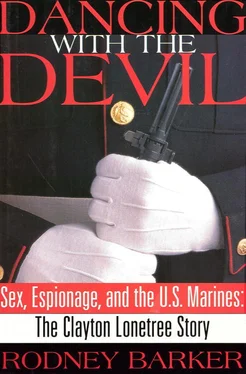So it was appropriate, in a way, that the first time he actually had a conversation with Violetta was on the metro. One day he followed her out of the embassy, down the sidewalk that bordered the Garden Ring boulevard, across Uprising Park with its hedges and benches, and beneath the shadow of the enormous granite-block skyscraper Stalin had built to prove to the world the might of Soviet architectural accomplishments, before arriving at the Barrikadnaya Station, named for the workers who had built barricades there in 1905 to protest the czarist regime. As she moved through the crowd of commuters and descended the escalator, he almost lost her, but he caught up in time to board the same train, the same car. And when the number of passengers thinned out, he approached her with an “Oh, hi,” as if their being there together were an accident.
That first conversation consisted mostly of small talk. She said it was unusual to see an American on the Moscow subway, and he told her how much it fascinated him. They discussed her job in the General Services section of the embassy, and she said she had been previously employed as the receptionist at Spaso House, where the American ambassador, Arthur Hartman, resided. They were still talking when it was her stop, and she exited with a luminous smile and a “Goodbye. See you tomorrow.”
“I couldn’t believe it,” he told his interviewers. “She was so beautiful.”
A week or so later, Lonetree said, he again followed Violetta to the Barrikadnaya metro. This time they became so involved in conversation during the trip that she missed her stop, which he took as a good sign. But when she got off, she made a reference to going home to her “family,” which made him wonder about her status. Was she married? He was reluctant to straightforwardly ask her, and in fact was distressed that he was even asking the question. He recalled thinking, I can’t believe it. I’m jealous about a Russian girl.
When he realized he was developing feelings for Violetta, it was not something he accepted heedlessly. He was fully aware that Marines were supposed to avoid contact with Soviet women. They were advised to seek female companionship primarily from nannies, the young foreign women employed by Western residents to take care of their children. But he was also aware of Marines who frequented the off-limits bars and picked up Soviet “night butterflies,” as they were called, and it seemed to him that everyone was getting away with something in Moscow, which made it easier for him to rationalize this.
“I started thinking, Okay, but play it safe. You can see her, but not as much or often as you’d like.”
In the weeks following, there were numerous incidents of causal conversation at the embassy but no planned meetings. Then in October, after he became angry about some MSG matter the nature of which he could not recall, he left the embassy to ride the metro and spotted Violetta on her way home. He entered her car and did not speak to her or sit with her initially. He did approach her eventually, but not with the usual cheerful greeting. She could tell something was bothering him, and upon arriving at her stop, she asked him if he wanted to get off and go for a walk. He shrugged and said, All right, he was planning to go for a walk anyway.
Her stop was named Tekstilshiki, for a textile plant. A broad boulevard passed a park and a lake on its way to a cluster of apartment buildings the size of cruise ships, and as they walked along it together, their conversation centered on his background, his perceptions of Moscow, and Violetta’s inquiries about the American way of life.
He told her he was a Native American but had never lived on a reservation. He’d spent most of his life in St. Paul, which had a climate similar to Moscow’s: humid in the summer, freezing in the winter. He told her that before coming to Russia he’d heard about the long queue lines and the drunks in the street, and had mostly negative impressions about the country. For example, he’d been told that Russian people didn’t think for themselves, and when asked for their opinion would repeat the official propaganda they’d been indoctrinated into believing. He also said he wanted to hear for himself what Radio Moscow had to say about Americans, and it was “a bunch of crap.” Everything was anti-American. Anti-Reagan. He said that at the Marine House they would tune in and laugh because it was such a joke. Ninety percent of what was said just wasn’t true.
“I know,” she said, and then she answered his questions. She said she was also a member of a minority, her ancestry being Ukrainian and Jewish, and she spoke too of a lonely childhood. She denied that she had ever been a member of Komsomol, the Communist youth organization, but she did try to explain the thinking of most Russian people about America. Yes, it had been stamped into their heads that America was the Number One Enemy, but that was because if anybody was a threat to their country, it was America. It was the only other superpower. And after Ronald Reagan had become president, his rhetoric had been aggressively anti-Soviet. So there were good reasons for the Soviet people to be fearful of America.
That said, she admitted that her own experience of Americans as individuals had led her to believe that most of them were good, friendly people. She particularly admired their openness. On the news, when Americans were interviewed they spoke their minds as freely as children, and she liked that. It was something unheard of in her society.
Their discussion moved to culture: the Russian books he’d read, the American books she was familiar with. Contrary to what he’d understood was Soviet taste in literature, which was not supposed to distract from the proletarian struggle and was supposed to inculcate correct principles and glorify Soviet life, Violetta’s taste was remarkably similar to his. She said her favorite American book was Gone With the Wind.
Ultimately they arrived at her apartment building, which was one of the so-called Khrushchev Boxes, a five-story prefab housing complex built in the late 1950s that was unattractive by all standards Americans were familiar with but provided Russian families with separate apartments. She invited him in, and he followed her up a narrow stairwell, entering a tiny, cluttered apartment but remaining close to the door. Violetta’s back was to him, and she was talking to a woman in one of the rooms when he saw a little girl peer around the corner at him. She was extremely shy and wouldn’t return his smile, but she was also curious, ducking her head back only to peek again. He thought it was neat. He was also relieved. The girl was probably around ten years old, making her too old to be Violetta’s daughter.
After putting on a scarf, Violetta said she was going to shop for groceries and on the way she would walk him back to the metro station. This time, as they walked, she advised him of her living situation. She said her parents were divorced and she lived with her mother and younger sister.
Listening to her talk, he was struck by the similarity in their circumstances and interests. He was an Indian, she was a Jew, each relative outcasts in their respective societies, each the product of a broken family. He was a student of Russia, she was curious about the West, so they both had an interest beyond the national borders of their respective countries.
On the ride back to the embassy, Lonetree thought long and hard about what was developing. “I knew it was going to be difficult as hell and could only lead to trouble,” he admitted to thinking, because it was common knowledge that the FSNs (foreign service nationals) who worked at the embassy were required to report back to some person, either in the foreign ministry or the KGB, about the habits of Americans they observed and any conversations they had. For that reason he had been wary of the questions Violetta had asked him, anticipating loaded inquiries. If she had delved into areas he thought were inappropriate to discuss, he told himself, he would have pulled back immediately and cut things off.
Читать дальше












